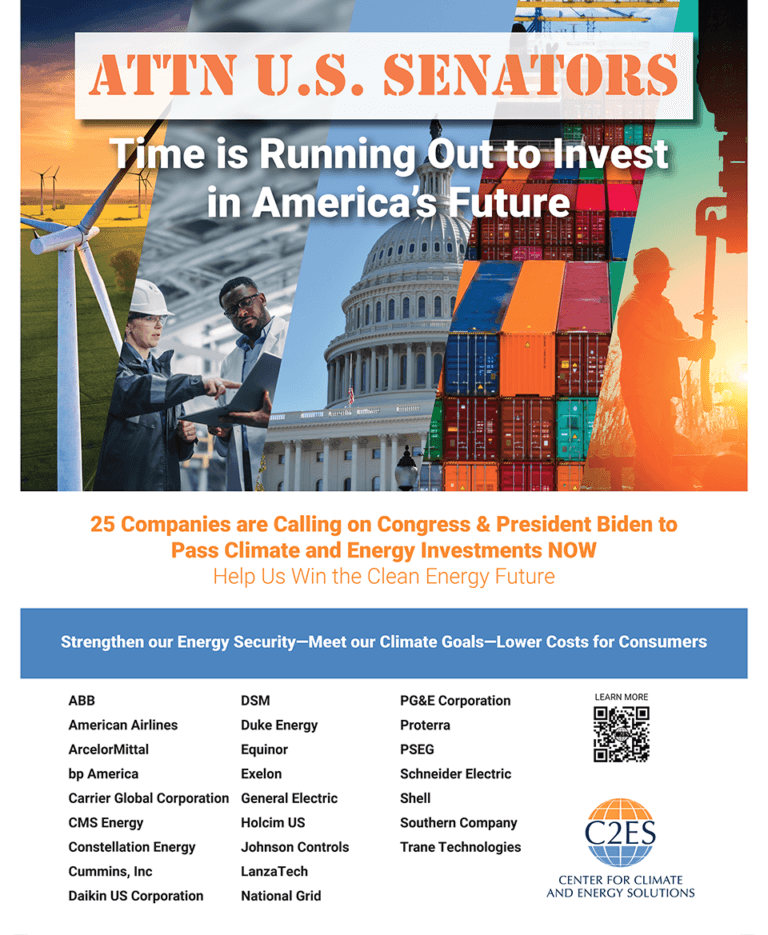Market-Based Mechanisms
C2ES plays key roles in several initiatives to accelerate corporate climate action. As a member of the Integrity Council for the Voluntary Carbon Market (ICVCM), we help establish standards for high-integrity carbon credits. C2ES serves as the Secretariat for the Energy Transition Accelerator (ETA), a groundbreaking public-private partnership that mobilizes private capital to support energy transitions in developing countries. Additionally, our Advanced and Indirect Mitigation (AIM) platform explores innovative market mechanisms to address hard-to-abate emissions across value chains. Through these efforts, C2ES is at the forefront of developing and implementing market solutions that enable businesses to maximize their climate impact while driving sustainable economic growth.
Corporate Low-Carbon Transition
Wider public understanding of credible corporate climate action is needed to sustain investment, provide policy clarity, and build public trust. Building on C2ES’s previous work developing and disseminating best practices on how different industry sectors are evaluating and disclosing their climate risks and opportunities to investors, C2ES launched a new project to develop insights on how companies develop and communicate their low-carbon transition plans to stakeholders. This project and its accompanying report aim to support and accelerate the development of low-carbon transition plans that align with the objectives of the Paris Agreement among companies in real-economy industry sectors.
Building Resilience
In the face of increasing climate impacts, climate resilience is critical for communities and businesses to thrive. C2ES advances new resilience strategies, provides leading policy analysis, and convenes stakeholders around emerging challenges to build broad support for action and make investment in resilience a clear choice for public and private decision-makers. Our efforts focus on helping communities enhance local climate resilience, advancing business leadership around resilience, and driving federal policy.
Corporate Engagement in Climate Legislation
Mobilizing Corporate Support for the IRA
C2ES believes that effective climate policy is crucial for driving economy-wide decarbonization and partners with forward-thinking companies to advocate for ambitious climate action. We mobilize business support for key legislation, as evidenced by our campaign in support of the Inflation Reduction Act. We continued to bring together corporate leaders in our Net-Zero Infrastructure Campaign where we pushed for investments in clean energy, transportation, and resilient infrastructure. Similarly, our Build Back Better campaign united business voices in support of climate-smart economic recovery. C2ES also participates in the AAA Framework for Climate Policy Leadership, encouraging companies to advocate for effective climate policies, align their operations and value chains with climate goals, and allocate resources to support the transition to a low-carbon economy.
Passage of the Infrastructure Investments and Jobs Act (IIJA), the CHIPS and Science Act, and the Inflation Reduction Act (IRA) represents an important and critical down payment on U.S. climate action. While this represents a significant first step toward meeting the U.S. goal under the Paris Agreement—50 to 52 percent reductions below 2005 levels by 2030 and net-zero emissions by 205— additional executive and legislative action is needed.
Shaping the Next Wave of Climate Policy
To complement and build upon existing federal legislation, C2ES is working with companies in the Business Environmental Leadership Council on policy in the following areas: permitting reform, implementing tech-neutral tax credits, and a national clean fuel standard.
- Permitting reform – C2ES and companies developed a set of policy recommendations in five key areas that would ensure successful permitting reforms: community engagement, transmission, critical materials, pipelines, and ensuring appropriate timelines. These recommendations include durable policies that will reduce greenhouse gas emissions, catalyze investment, create good-paying jobs that benefit all Americans, and strengthen our national security by expanding domestic supply chains for low- and zero-carbon technologies.
- Tech-neutral tax credits – C2ES and companies developed and submitted formal guidance to the U.S. Treasury on implementing the tech-neutral tax credits, 45Y and 48E. The guidance encouraged the administration to issue effective and timely guidance to ensure companies have the support they need to incentivize innovation and bring new technologies to scale.
- Clean fuel standard – C2ES and companies have launched a clean fuel standard policy campaign (CFS) to identify the scope and design elements of an effective national CFS and educate policymakers on the need for enactment through federal legislation.


 The
The 
